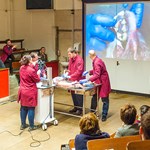Search - Research
201 - 210 of 241 results
-
London-Liverpool research alliance announces new grants to further the fight against infectious disease and antimicrobial resistance
The RVC, and its partners in The Bloomsbury SET programme, will bring together industry and academia to strengthen the response to global human and animal health challenges The Bloomsbury SET – a knowledge exchange programme led by the Royal …The RVC, and its partners in The Bloomsbury SET programme, will bring together industry and …
-
RVC and LSHTM publish joint study evaluating the Government’s Anti-Microbial Resistance Strategy
The Royal Veterinary College (RVC) together with the London School of Hygiene & Tropical Medicine’s Policy Innovation and Evaluation Research Unit (LSHTM PIRU) has published an evaluation study on the Government’s Anti-Microbial Resistance (AMR) …The Royal Veterinary College (RVC) together with the London School of Hygiene & Tropical Medicine’s …
-
Scientists discover songbirds have an unusual chromosome
A new study, involving scientists from the Royal Veterinary College (RVC) in England and the Institute of Cytology and Genetics (ICG) in Russia, has found that all songbirds have an additional chromosome in their germ cells unlike other avian species.A new study, involving scientists from the Royal Veterinary College (RVC) in England and the …
-
New study explains how fish got their fingers
New analysis of anatomical evidence shows how the limbs of land vertebrates (such as mammals and reptiles) originated from the fins of water-bound fishes. -
Young, male and crossbred cats at most risk of road accidents
Being young, male and crossbred increases a cat’s chances of being hit by a car, according to the findings of a new paper published today. -
Wildebeest muscles almost three times more efficient than a car engine
Wildebeest muscles have an extremely high efficiency of 62.6%. By comparison, most animal muscles and a car engine are only 25% efficient -
Hopes to improve practise after first systematic review of the effectiveness and safety of anti-epileptic drugs in cats
Researchers from Ghent University (UGhent), Austria Veterinary Medicine School (Austria VetMed) and the Royal Veterinary College (RVC) have found that testing anti-epileptic drugs’ effectiveness and safety for cats has been generally subpar, worse than what was formerly reported in dogs.Researchers from Ghent University (UGhent), Austria Veterinary Medicine School (Austria VetMed) and …
-
Leading veterinarian awarded prestigious National Teaching Fellowship
An RVC professor has been honoured with a national award in recognition of her substantial national and international contributions to education and pedagogy. -
Wild Cats Uncovered
Leading experts in feline anatomy from the RVC and UCL perform a post mortem of a cheetah in front of a live audience -
First ever systematic review and meta-analysis of adverse effect of antiepileptic drugs in canine epilepsy
Researchers found that much of the evidence for the medical treatment of canine epilepsy was based on subpar reporting of adverse effect and in studies that were below the expected standard.How safe are antiepieleptic drugs? RVC research sheds light on epilepsy treatments.
Researchers …







.jpg?v=638497412984389645)


